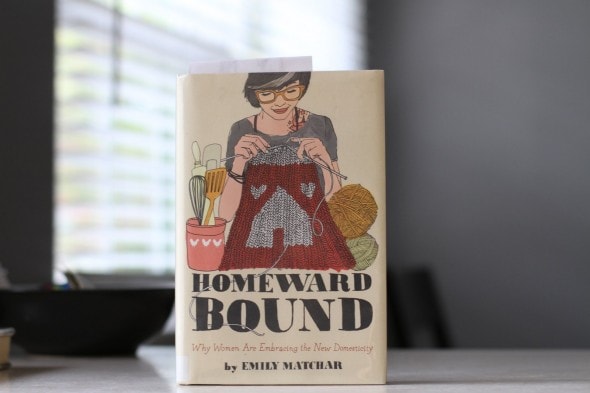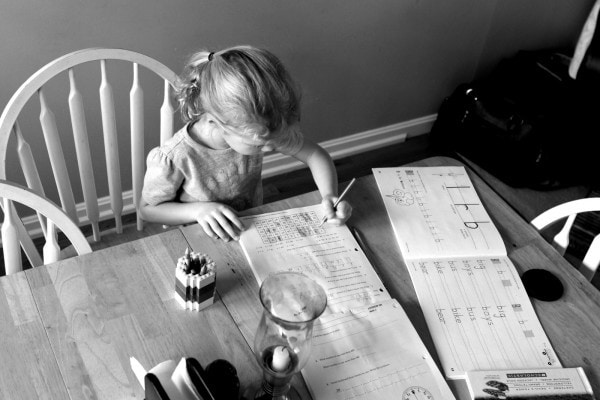I said so on Instagram when I finished it, and promised more details to those who asked.
Ready?

I heard about this book when there was a bit of a brouhaha in the comments on Soulemama’s blog (if I recall correctly, it was of the “How do you do everything?” variety.), and someone mentioned this book because the author covered the Soulemama blog.
Because I am a blogger myself, I always find books and articles about blogging/bloggers to be fascinating, so I put it on hold at the library.
When I first started reading the book, I fell mostly into the “This is intriguing!” camp because it’s terribly interesting to read what someone outside the blogosphere thinks of us.
But then I started to become increasingly annoyed with the book and the author.
Basically, she’s talking about a trend she’s observed of women leaving the workplace to start up home businesses or to be super-duper homemakers. Since a lot of these kinds of people blog about it, she ends up talking about bloggers a lot.
In the book, she covers all the problems that she sees with this DIY, homemade, natural-food-eating trend.
(People who opt out are no longer motivated to work for the common good, opting out is privilege-based and selfish, we’re letting down other women, people who opt out are mostly women, etc.)

Here’s my biggest beef, though: the book is tremendously lacking in research-based evidence.
Are there actually a significant number of people ditching their jobs in favor of home-based businesses? Or does it just seem so because people who do this are so visible on the web?
Is it true that the changes privileged people make have no positive effect on the less privileged?
(The fact that Aldi, a food retailer which is quite the opposite of Whole Foods, now carries far more organic and fresh food than they did ten years ago makers me wonder. I’m pretty sure this cultural change in food demand started with some privileged people.)
The problem is that without research, all of this is just one woman’s opinion, based on anecdotal evidence.
(The book is rife with interviews of individuals.)
It reminded me of how some people approach homeschooling: they look at it, see something they think could be a problem, and decide it must be so, regardless of what the evidence says.
For instance: “Wow, homeschoolers take so few tests. They must really do poorly when they take the SATs or transition to a college classroom.”
But that’s not what research says.
(I understand that that research may not prove homeschoolers do BETTER on tests, because there need to be adjustments for class and whatnot, but I think it does at least show that homeschoolers do not perform poorly on tests.)
Or they see an example of a problematic homeschooler and assume that all homeschoolers are like that.
“I met a homeschooled kid and he was a dorkopotamus. Homeschooling makes kids into social misfits.”
(Which, I must point out, is as ridiculous as assuming all public school makes kids into weirdos based on observance of the dorky kid in your middle school class.)
Another problem with the book is that the author didn’t seem to be trying terribly hard to be unbiased.
For instance, when profiling a homeschooling family who has a home business she says, “So while the other kids in the county study phonics and long division, these girls process turkeys and help to make soap, lip balm, and jelly.”
Because homeschooling is pretty efficient, it may be factually true that the girls are done with their schoolwork and are helping with lip balm at 2:00pm, while other children are at school.
But by phrasing it as she did, she seems to be deliberately trying to make readers think the girls aren’t getting schooled in phonics at all and are rather enslaved child laborers (the poor dears!) I don’t know the family, but I highly, highly doubt this is the case.
Also, when I got to the end of the book, I was reminded of how feminism sometimes feels as oppressive as what it’s fighting.
If feminism is about giving women the freedom to make choices, then why the pushback over choices that don’t involve an out-of-the-home career? Why can’t we just let each other make varying choices?
Why is it ok for women to choose to hold a full-time job, but not ok for women to start their own businesses?
Why is it ok to be a teacher, but not a homeschooling mom?
Why is it ok to work in a soap-making factory but not ok to have a small soap-making operation at home?
While it’s not practical to expect all of us to go home and have a lip balm business (I want my pediatrician to keep practicing! And we do need teachers and police officer and a myriad of other non-home-based workers.), I’m not convinced there’s a problem with some of us choosing that route.
I realize I’m making the book sound like a total dud, which it wasn’t. It was interestingly-written, some parts of it were good (the chapter about food) and did actually contain some research (the chapter about vaccines), and it did give me lots of food for thought, despite the fact that I disagreed with a lot of what she said.
So.
There you have it: possibly the longest single-book review I’ve ever written.
____________________________
If you read this book, I am super interested in what you thought! Please do share.


JD
Wednesday 5th of November 2014
Unlike some commenters, I now want to read this book, just to see for myself what was said. Like some commenters, I was home for three years with two very young children, then back to work. I was raised by a SAHM, but my aunts and grandmother all worked outside the home. I never thought it was odd that they worked at outside jobs, or that my mother stayed home with the kids. I guess I got the best of both role models. I have never criticized a woman for working outside the home or staying home because of these dear women. For some women, it's cheaper to stay home than pay childcare that eats one's paycheck. For some, it's much cheaper to pay for childcare while working a job. For some, simply the desire to work or stay at home makes the choice. It all depends on the woman and her circumstances. To criticize either choice without knowing circumstances, or as a generalization, just seems silly to me. I have to read this book now! I love to poke holes in arguments, as Kristen has done so well here, and I think this book may give me the opportunity to do a little on my own.
Sarah B.
Tuesday 4th of November 2014
Your thoughts about the book and the hipster book cover make me never want to read this book! Don't care for opinion based books with NO facts to back them up!
Laura Vanderkam
Tuesday 4th of November 2014
I haven't read this book. I did read Shannon Hayes' Radical Homemakers a few years ago, and had a very negative reaction to that, which is writing about this alleged trend from the opposite perspective (she's all for it). But largely, you're right that anecdotes aren't data. Just because a few women that author X has spoken to have done Y doesn't mean that Y is the wave of the future. I write a lot of trend stories. I know how this formula works! Three anecdotes plus some statistic (which need not reveal the whole picture) and you've got a trend piece.
Also, home-based businesses and bloggers are a very big and varied group. If you asked me to describe myself I might call myself a full-time working mom. But I guess technically I run a home-based business and I blog. Sometimes I blog about my garden and my kids. Would I wind up in this category? Hard to know!
Kristen
Wednesday 5th of November 2014
I heard that her book is also remarkably lacking in data. Perhaps I should read it, just so I've read an un-researched book from both sides. Ha.
KatieD
Tuesday 4th of November 2014
I admire your patience at being a homeschooling Mom. I could never have done it! However, about 20 years ago my then 12 year old son had to be off school for three weeks. Each week his Grade 7 teacher gave us all the school work he had missed. On Saturday mornings he sat down (whining and unwilling!) and completed all the work in about 3 - 4 hours! I was amazed. It certainly wasn't an ideal situation and I'm sure the teachers would have taught him much better than I did. However, it was a real eye opener to realize that so much of school life is social. Its obviously an important part of their curriculum. But its not all work and no play at school either!
Kristen
Tuesday 4th of November 2014
Mr. FG had a similar experience when he had mono as a kid...his work was done in a few hours each day at home.
It just takes a lot longer to do school when you have a roomful of kids rather than a few.
Anne
Tuesday 4th of November 2014
I have to tell you Kristin, that I had a pretty negative and stereotyped view of homeschoolers until I started reading your blog. It was been educational and I have changed a lot of my views because of it.
Kristen
Tuesday 4th of November 2014
Aww, I'm so glad we were able to dispel some of the stereotypes. Yay!